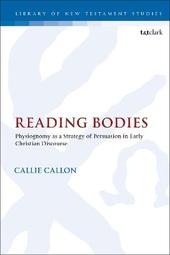
|
Reading Bodies: Physiognomy as a Strategy of Persuasion in Early Christian Discourse
Paperback / softback
Main Details
| Title |
Reading Bodies: Physiognomy as a Strategy of Persuasion in Early Christian Discourse
|
| Authors and Contributors |
By (author) Dr. Callie Callon
|
| Series | The Library of New Testament Studies |
|---|
| Physical Properties |
| Format:Paperback / softback | | Pages:184 | | Dimensions(mm): Height 234,Width 156 |
|
| Category/Genre | Biblical studies |
|---|
| ISBN/Barcode |
9780567695499
|
| Classifications | Dewey:230.019 |
|---|
| Audience | | Tertiary Education (US: College) | |
|---|
|
Publishing Details |
| Publisher |
Bloomsbury Publishing PLC
|
| Imprint |
T.& T.Clark Ltd
|
| Publication Date |
23 July 2020 |
| Publication Country |
United Kingdom
|
Description
Callie Callon investigates how some early Christian authors utilized physiognomic thought as rhetorical strategy, particularly with respect to persuasion. Callon shows how this encompassed denigrating theological opponents and forging group boundaries (invective against heretics or defence of Christians), self-representation to demonstrate the moral superiority of early Christians to Greco-Roman outsiders, and the cultivation of collective self-identity. The work begins with an overview of how physiognomy was used in broader antiquity as a component of persuasion. Callon then examines how physiognomic thought was employed by early Christians and how physiognomic tropes were employed to "prove" their orthodoxy and moral superiority. Building on the conclusions of the earlier chapters, Callon then focuses on the representation of the physiognomies of early Christian martyrs, before addressing the problem of the acceptance or even promotion of the idea of a physically lacklustre Jesus by the same authors who otherwise utilize traditional physiognomic thought.
Author Biography
Callie Callon is an Assistant Professor at the University of St. Michael's College, Canada.
|